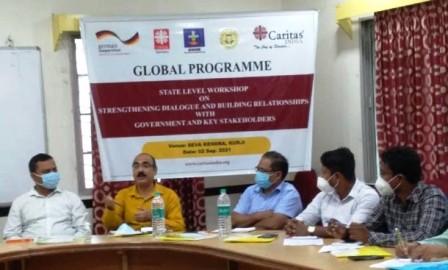Farmers on Bihar are facing losses and failed crops, primarily because of climate change. This leads to increasing poverty and exodus of farmers to other places in search of employment. In such a scenario, it is most important that government departments, farmer societies, and civil society organisations dialogue and collaborate on strategies that address the larger issues around food security and climate change.
On Thursday, Sep 3, the Global programme on food security and social inclusion organized a workshop with experts regarding Climate change and its effects on food security.
The Forum for Social Initiatives in association with Bihar Water Development Society, Patna organized a state level Workshop on Dialogue and Relationship building workshop with Government and other humanitarian agencies under this Global Programme.
The key observation identified by the experts was that Climate change has continuously been one of the pivotal reasons for the farmers of Bihar, and this unfavourable condition for growing crops had lead to migration of the farmers to find work in other states.
The initiative has been launched in several states, like Bihar, Orissa, Assam and West Bengal with an objective to address the issue of Climate change and Food Security.
BWDS Director Fr. James Shekhar, inaugurated the Workshop, introducing the participants to the objectives of the organisation and its role in promoting food security since the early 1960’s. He also highlighted the development programmes of the Bihar Regional forum.
He appreciated the work of Government during Covid pandemic and spotlighted the work done by NGOs and media at the time.
Abhishek Kumar from Caritas India, a non governmental organization based in New Delhi, dealt with some gaps of the Global Programme aimed at micro, meso and macro level, towards achieving the Sustainable Development Goals related with Climate Change, food security and Social inclusion in the context of the vulnerable populations in Bihar state.
The senior consultant of Bihar State Disaster Management ( BSDMA ), Mr. Neeraj Kumar, spoke of the initiatives taken by BSDMA with regard to climate change. He added that the BSDMA and the government were doing all they could.
Standard Operating Procedures are being prepared, and capacity building training going on for the personnel involved. The skill development training of task force has been useful. He also pointed out that there were 459 deaths in the 2020 just because of Lightning. He concurred that all need to work in coordination and minimize the risks during disasters.
Rakesh Tiwary, representing the A.N SINHA institute Patna focused on key social dimensions and impact of Climate change on food security. He talked about the important role that NGOs play during any calamity or a pandemic.
From Save the Children and Oxfam Mukul and Chandan enlightened the need of strengthening of networks of like-minded institutions particularly at the grassroots level.
Ajay Kumar, an online journalist stated that the Media effectively partners with other organizations during emergencies. He mentioned that media is not only a tool to project the daily news but also an instrument to reflect the work of government and humanitarian agencies. It plays a central role and helps in making people aware of the broader view.
Sanjay Pandey, Convener of Bihar Inter Agency Group (BIAG) detailed the coordination between Government and NGOs in development sectors, and stressed that efforts should be done in an unified manner of development intervention.
Saurabh Kumar highlighted the social inclusion aspect with various development work done by the Government and agencies. Anand Vijeta, Google Early Warning System and Shrawan ji, the expert on first response in disasters also pin pointed the concerns to be dealt with in advance.
The Caritas India model to bring community leaders together to work for enhanced nutritional food securities and access for all was applauded and planned to be implemented.
[By Nishant Mishra from inputs]



